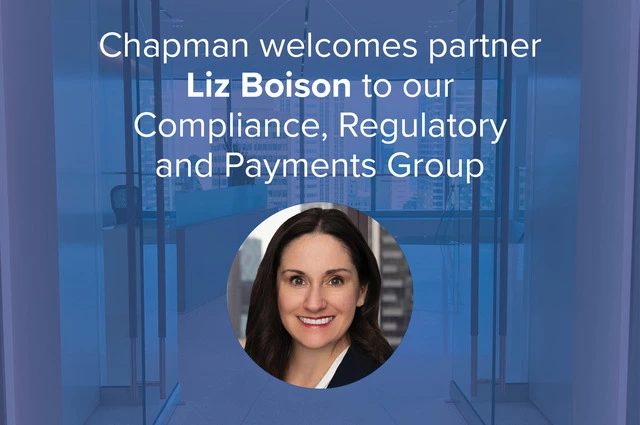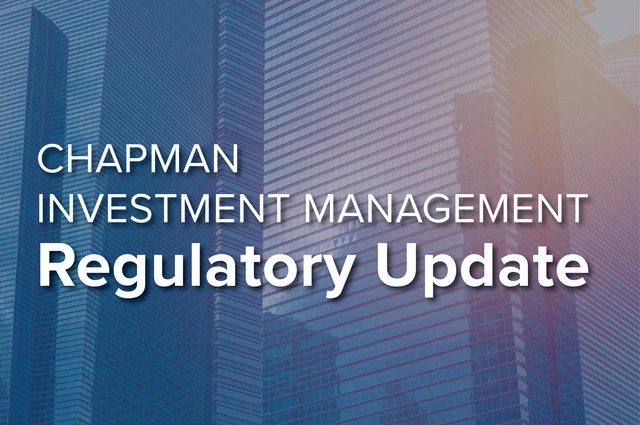- Topic: Consumer Finance
33 matches.
Chapman wrote the book on the marketplace lending regulatory landscape that the entire industry has come to rely upon. First published in 2013, the 2024 update covers a vast array of topics affecting the marketplace lending industry.
In its 2024 Supervisory Priorities, the NCUA set out examination priorities based on activities that pose the highest risk to federally insured credit union members (referred to as “credit unions”) and that are responsive to the continuous stream of challenges facing credit unions in this current market. It should come as no surprise to anyone that liquidity risk is once again an examination priority for 2024, as the economic environment continues to be uncertain. This all follows on the heels of the Addendum to the Interagency Policy Statement on Funding and Liquidity Risk Management: Importance of Contingency Funding Plans issued in July 2023 (the “Addendum”), highlighting the importance of contingency funding plans as a crucial component of managing funding and liquidity risk.
On June 5, 2023, the Governor of Colorado signed into law House Bill 23-1229 which contains a purported “opt out” of federal preemption made available to state chartered, FDIC insured institutions. It appears aimed at least in part to online lenders making loans to Colorado residents. Whether this action will trigger additional states to attempt a similar move or whether this legislation is even valid will likely end up in litigation, teeing up another potential battle on federal preemption vs. states rights and likely leaving Colorado borrowers in limbo for some time to come. Of note, this law does not become effective until July 1, 2024.
The parties to the closely watched litigation by the Attorney General of Colorado as Administrator of the Colorado Uniform Consumer Credit Code against two marketplace lending platforms have agreed to settle the litigation.
On July 22, Online Lending Policy Institute hosted a conversation covering the new FDIC rule issued on June 25 which adopts the common law doctrine of “valid when made” as well as other topics related to fintech.
H.R. 748 better known as the CARES Act or more informally as the $2 trillion stimulus bill signed by President Trump on March 27, 2020, contains one important provision for all consumer lenders and another two provisions related to federally-backed mortgage loans.
The California Consumer Privacy Act of 2018 went into effect on January 1, 2020 and imposes extensive disclosure and record-keeping requirements on businesses that handle personal information.
On September 30, the Governor of California signed into law Senate Bill No. 1235, which amends the California Financing Law (previously known as the Finance Lenders Law) to impose new disclosure requirements on licensed commercial lenders and brokers including for online lending programs doing business in California.
A recent decision from the U.S. Court of Appeals for the Third Circuit has created a circuit split in how the federal circuit courts have interpreted the statute of limitations as it applies to the Fair Debt Collection Practices Act.
Compliance with the Telephone Consumer Protection Act has never been simple, and a number of conflicting and confusing rulings over the last several years have made it that much more difficult. The TCPA contains a confusing array of regulations depending on what kind of phone is being called, who is calling and what purpose the call serves, and whether the person being called has given permission.
More than a year after the Consumer Finance Protection Bureau submitted a proposed rule to limit consumer financial services contract arbitration clauses, the CFPB sounded the death knell on July 10, 2017, when it released its long-awaited final rule.
In a unanimous decision on June 12, the United States Supreme Court held that a purchaser of defaulted debt who pursues repayment is not a “debt collector” under the Fair Debt Collection Practices Act.
The Supreme Court continues to redefine the scope of the Fair Debt Collection Practices Act, with one highly anticipated ruling issued this week and another expected before the Court adjourns for the summer in late June.
- May 2017 (Originally Published March 8, 2017)The Banking Law Journal
This article discusses a financial institution’s obligation to manage risks of its HELOC Home Equity Line of Credit portfolio, focusing on the applicable regulatory requirements and restrictions on the ability to freeze or reduce HELOCs during the draw period.
2016 was a record year for filings under the Telephone Consumer Protection Act of 1991. In 2016, litigants filed 4,860 TCPA lawsuits, an increase of nearly 32% from 2015. But what does 2017 hold? What can companies who call customers to service or collect debts expect?
The U.S. Court of Appeals for the D.C. Circuit made headlines following its decision in the PHH Corporation et al. v. Consumer Financial Protection Bureau case. The Court found that the CFPB’s single-director, removable-only-for-cause structure was unconstitutional. However, the Court has now vacated that order in its entirety and set the case to be heard again en banc.
- Legal, Operations, and Strategy Briefs for Financial Institutions
In this edition:
- Mortgage Servicing Foreclosure Practices
- OCC Semiannual Risk Perspective
In one of his first Presidential acts, President Trump has named Commissioner Ajit Pai as Chairman of the Federal Communications Commission. Chairman Pai has become well-known for his dissenting opinions during his time with the FCC, including his dissent to the most recent Telephone Consumer Protection Act Omnibus Ruling and Order issued in July 2015.
- Legal, Operations, and Strategy Briefs for Financial Institutions
On Friday, Comptroller of the Currency Thomas Curry announced that the Office of the Comptroller of the Currency will issue limited-purpose bank charters to qualified fintech companies.
- Legal, Operations, and Strategy Briefs for Financial Institutions
In this edition:
- Deposit Insurance Determination Rule
- FFIEC Revises Its Consumer Compliance Rating System
- Servicemembers
The U.S. Court of Appeals for the D.C. Circuit heard oral argument yesterday in a consolidated case arguing that the Federal Communication Commission has overstepped its bounds in its most recent interpretation of the Telephone Consumer Protection Act.
On October 11, the U.S. Court of Appeals for the D.C. Circuit issued an important decision involving the Consumer Financial Protection Bureau. Not only did the Court find that the agency’s structure was unconstitutional, it also ruled that the CFPB violated due process, and is subject to the statutes of limitations embodied in the laws it seeks to enforce.
- Legal, Operations, and Strategy Briefs for Financial Institutions
In this edition:
- NACHA Operating Rules — New Unauthorized Entry Fee
- Customer Due Diligence — Beneficial Ownership Rule
- Limited English Language Proficiency Customers
- Legal, Operations, and Strategy Briefs for Financial Institutions
In this edition:
- Recent Action by the OCC of Special Concern for Directors, Senior Managers, and Compliance Officers
- FDIC Provides Additional Guidance on Corporate Governance
- January 2016 (Originally Published August 11, 2015)Client Alert
The Banking Law Journal republished a Chapman Client Alert.
- Legal, Operations, and Strategy Briefs for Financial Institutions
In this edition:
- CFPB Guidance on Private Mortgage Insurance Cancellation
- FDIC Announces Settlement with Credit Card Issuer Related to the Sale of Add-On Products
- Servicemember Updates
- Eleventh Circuit Rules on Applicability of FDCPA to Bank
- Legal, Operations, and Strategy Briefs for Financial Institutions
In this edition:
- Telephone Consumer Protection Act Declaratory Ruling
- CFPB First Monthly Complaint Report
- Treasury Department Inquires about Marketplace Lending
- Legal, Operations, and Strategy Briefs for Financial Institutions
In this edition:
- Servicemembers Update
- CFPB Consumer Complaint Narratives
- Private Student Loans and Cosigners
In this issue:
- CFPB Arbitration Study: First Step to Restricting their Use?
- 7th Circuit Requires Servicers to Credit Payments on the Day Authorized
- Target Data Breach Settlement
- Special Edition: To the Point!
The Consumer Financial Protection Bureau has issued its 800+ page proposed rule (with commentary) on prepaid cards.
- Special Edition: To the Point!
The Consumer Financial Protection Bureau has issued a proposed rule that would bring prepaid products under the Electronic Fund Transfer Act and make the protections currently afforded to credit cardholders under Regulation Z applicable when credit features are obtained in connection with a prepaid account.
In this issue:
- Department of Housing and Urban Development 2013 Disparate Impact Rule is Vacated
- FFIEC Cybersecurity Guidance
- 2014 Federal Interagency Fair Lending Hot Topics Webinar
In this issue:
- Qualified Mortgage Points and Fees Cure
- Posting Privacy Notices Online
- National Survey of Unbanked and Underbanked Households









